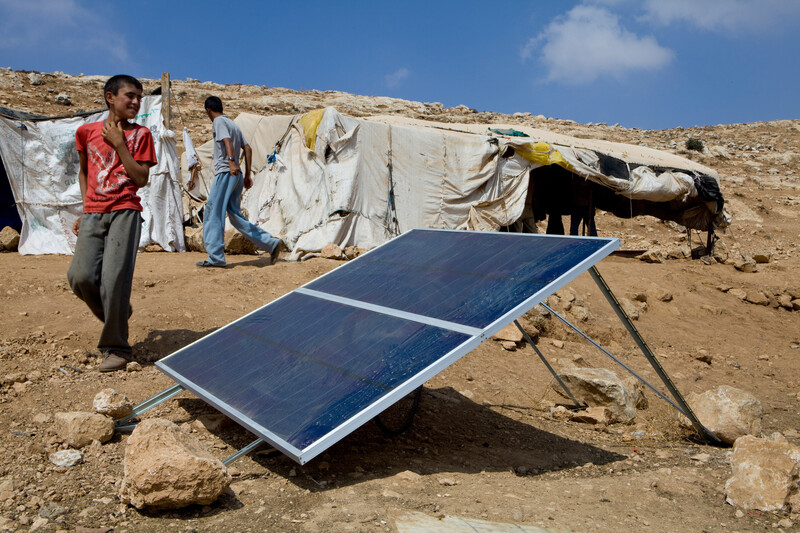The Electronic Intifada Rome 19 March 2015

“Green” Israel has issued orders to halt installation of solar panels intended to help Palestinians.
ActiveStillsIsrael is using its participation in a major international exhibition as an opportunity to present a positive image that ignores the apartheid system imposed on Palestinians.
A series of propaganda videos have been posted on the Internet as part of Israel’s contributions to Expo 2015, the world’s fair, which will kick off in Milan, Italy, on 1 May. Portraying Israel as committed to peace and protection of the environment, one such video boasts that Israel invented the solar water heater.
This attempt to draw attention to Israel’s record on renewable energy appears to be in keeping with the fair’s message of “sustainability.” Yet it also smacks of hypocrisy. Israel has issued orders to halt the installation of solar panels intended to benefit Palestinians in the occupied West Bank.
The official slogan of Expo 2015 is “feeding the planet, energy for life.” Organizers claim some 20 million people are expected to visit the fair.
Israel is setting up a pavilion at a prominent spot in the 1.1 million square meter venue where the fair will be taking place. The Israeli logo for the pavilion is a stylized version of the word emet, Hebrew for “truth.”
Deceptive
The logo appears ironic, considering Israel’s destruction of Palestinian agriculture and natural resources as well as deceptive practices being used by Israel’s supporters in Italy.
Last month, the Council for a Beautiful Israel (CBI), an organization that claims to have “led environmental action” in Israel’s towns and cities, held an event in Rome. Billed both as a celebration of Tu Bishvat, a Jewish holiday known as the “new year of the trees,” and a preparation for Expo 2015, it was attended by Israeli diplomats, Italian politicians and leading figures from three ecological groups: Greenpeace Italy, WWF Italy and Legambiente.
A statement issued by the CBI’s Italian branch following the event, and rehashed by several media outlets, gives the distinct impression of cooperation between CBI and the green organizations.
BDS Italy, a group supporting the Palestinian call for boycott, divestment and sanctions against Israel, contacted all three organizations. They confirmed there was no current or planned cooperation with CBI and that they had no intention of accepting an invitation for a CBI-sponsored trip to Israel, despite reports that one was extended.
“Beautification” of war crimes
The CBI’s Italian branch was set up in 2012. A CBI newsletter indicates that the branch is dedicated to “changing Israel’s image” by focusing on “environmental education.”
Attempts to divert attention from Israel’s human rights abuses by presenting it as an environmental champion are regarded as “greenwashing” by Palestine solidarity activists.
In the CBI’s case, such attempts cannot conceal how the organization is active in the settlements that Israel is building in the occupied West Bank. For example, it has given a number of awards for cleanliness to Beitar Illit. Like all of Israel’s settlements in the West Bank, Beitar Illit is illegal under international law.
The CBI also enjoys a close relationship with the Israeli military. Since 1981, it has run a competition to honor “beautiful” military bases. The CBI’s website suggests that its teaching programs for Israeli soldiers aim to instill them with “environmental preservation and beautification values.” Yet it neglects to mention that the Israeli military has caused environmental devastation in Gaza by, among other things, bombing sewage treatment facilities.
Demonstrating its cozy relationship to the top levels of government, CBI’s annual award ceremony is held at the Israeli president’s residence.
The 2012 recipient of the CBI’s “achiever” award was the Jewish National Fund (JNF), an organization that has reserved a large proportion of present-day Israel for the exclusive use of Jews.
One of the films to be screened in the Israel Pavilion at Expo 2015 celebrates the JNF’s “reforestation” activities which hide the remains of destroyed Palestinian villages. The JNF is also seeking to uproot Palestinian communities who remained inside Israel after that state’s formation.
Settlement wineries
Meanwhile, the Italian association Cities of Wine will undertake a “study trip” to Israeli wineries next week.
Several of the wineries on the itinerary for the tour are based in or operate in settlements in the West Bank and in the Golan Heights, an Israeli-occupied part of Syria. These include Yatir, which was founded by settlers in the Hebron area, and Assaf, which operates in the Golan Heights.
Stefania Pianigiani, a representative of Cities of Wine, tried to justify the trip. “We don’t get into political issues,” she told The Electronic Intifada. “Our interests are scientific and cultural with regards to wine production.”
When asked how the wineries on the itinerary were selected, Pianigiani said that her organization relied on Israeli tour operators.
Both Israeli guides leading the tour have worked for wineries with vineyards in the Golan or the West Bank. Ruti Ben Israel, who reportedly is on “a mission to put Israeli wines on the map of the international wine connoisseur,” has worked for Carmel, Yatir’s parent company. The other guide, Yiftah Perets, is currently employed by Binyamina, which owns vineyards in the Golan Heights.
Giuseppe Tondo, mayor of Salice Salentino, a town in the Apulia region of Italy among Cities of Wines’ 400 members, has nonetheless endorsed the boycott call. He has urged Cities of Wine to cancel the trip.
Stephanie Westbrook is a US citizen based in Rome, Italy. Her articles have been published by Common Dreams, Counterpunch, The Electronic Intifada, In These Times and Z Magazine. Twitter: @stephinrome





